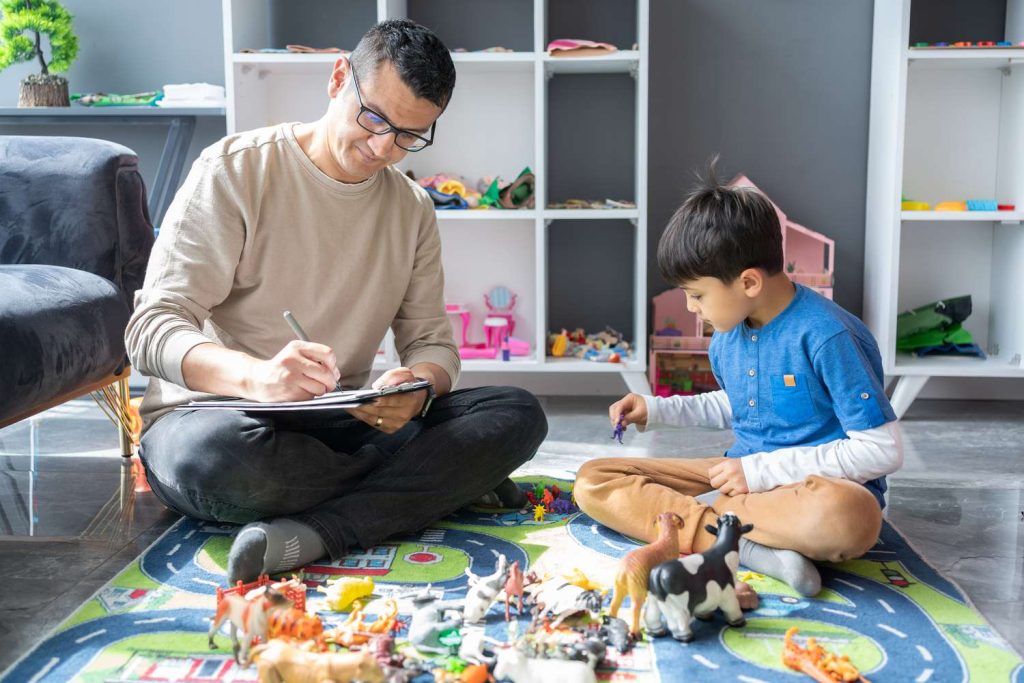In today’s world, children face numerous challenges that can impact their mental health and well-being. As a parent, recognizing when your child needs help and understanding the role of child therapy can be crucial in providing them with the support they need. This article aims to provide parents with essential information about child therapist, including its benefits, types, and how to choose the right therapist for your child.
What is Child Therapy?
Child therapy, also known as child counseling or psychotherapy, is a specialized field focused on addressing the emotional, behavioral, and mental health needs of children and adolescents. It involves working with a trained therapist who uses various therapeutic techniques to help children understand their feelings, develop coping strategies, and improve their overall mental health.
When Should Parents Consider Child Therapy?
Parents should consider child therapy if they notice persistent changes in their child’s behavior, mood, or social interactions. Some common signs that a child might benefit from therapy include:
- Excessive anxiety or worry
- Persistent sadness or depression
- Behavioral problems at school or home
- Difficulty making or maintaining friendships
- Sudden changes in eating or sleeping habits
- Withdrawal from family or social activities
- Decline in academic performance
- Experiencing a traumatic event, such as a divorce, death, or abuse
Early intervention through therapy can prevent these issues from becoming more severe and can help children develop resilience and healthy coping mechanisms.
Benefits of Child Therapy
1. Improved Emotional Expression
Children often struggle to articulate their feelings, leading to frustration and behavioral issues. Therapy provides a safe space for children to express their emotions and learn to communicate their needs more effectively.
2. Development of Coping Skills
Therapists teach children various techniques to manage stress, anxiety, and other emotional challenges. These coping skills can include mindfulness, relaxation exercises, and problem-solving strategies.
3. Behavioral Improvements
Therapy can help address the root causes of behavioral issues, such as anger, defiance, or hyperactivity. By understanding these underlying factors, children can develop healthier ways to respond to situations.
4. Enhanced Self-Esteem
Therapy can help children build a positive self-image by recognizing their strengths and achievements. This boost in self-esteem can improve their confidence and willingness to take on new challenges.
5. Better Social Skills
Therapists work with children to enhance their social skills, such as empathy, cooperation, and conflict resolution. These skills are essential for building and maintaining healthy relationships.
6. Healing from Trauma
Children who have experienced trauma can benefit significantly from therapy. Therapeutic techniques help children process their experiences, reduce symptoms of trauma, and develop a sense of safety and stability.
7. Strengthened Family Relationships
Family therapy can address communication issues and resolve conflicts within the family unit. This approach helps create a supportive environment for the child and improves overall family functioning.
Types of Child Therapy
1. Cognitive Behavioral Therapy (CBT)
CBT is a widely used approach that focuses on identifying and changing negative thought patterns and behaviors. It helps children develop healthier ways of thinking and coping with stress.
2. Play Therapy
Play therapy uses play as a medium for children to express their feelings and work through issues. It is especially effective for younger children who may have difficulty verbalizing their emotions.
3. Art Therapy
Art therapy allows children to express themselves through creative activities, such as drawing, painting, or sculpting. This form of therapy can help children explore their feelings and experiences in a non-verbal way.
4. Family Therapy
Family therapy involves working with the entire family to address issues that affect the child. This approach helps improve communication, resolve conflicts, and create a more supportive home environment.
5. Trauma-Focused Therapy
Trauma-focused therapy is designed to help children who have experienced traumatic events. It uses specific techniques to help children process their trauma and reduce associated symptoms.
Choosing the Right Child Therapist
1. Identify Your Child’s Needs
Determine the specific issues your child is facing to find a therapist with the appropriate expertise. Different therapists specialize in various areas, such as anxiety, ADHD, or trauma.
2. Check Credentials and Experience
Ensure the therapist is licensed and has experience working with children. Look for credentials such as Licensed Clinical Social Worker (LCSW), Licensed Professional Counselor (LPC), or Licensed Marriage and Family Therapist (LMFT).
3. Ask for Recommendations
Seek recommendations from your child’s pediatrician, teachers, or other parents who have had positive experiences with child therapists. Personal referrals can provide valuable insights into the therapist’s effectiveness and approach.
4. Consider the Therapist’s Approach
Different therapists use various therapeutic approaches. Research these methods to determine which might be the best fit for your child. During the initial consultation, ask the therapist to explain their approach and how it will benefit your child.
5. Evaluate Communication and Rapport
Observe how the therapist interacts with your child during the initial meetings. A good therapist should make your child feel comfortable and heard. The ability to build a trusting relationship is crucial for the success of therapy.
6. Consider Logistics
Practical considerations such as location, availability, and cost are important. Choose a therapist whose office is conveniently located and whose hours fit into your schedule. Inquire about fees and whether they accept your insurance or offer a sliding scale based on income.
7. Trust Your Instincts
Trust your instincts as a parent. If something feels off or if you’re not comfortable with the therapist, it’s okay to seek another opinion. The right therapist should be someone you feel confident in and comfortable with, knowing they have your child’s best interests at heart.
Conclusion
Understanding child therapy and knowing when to seek help is essential for your child’s mental health and well-being. By recognizing the signs that your child might need therapy, understanding the benefits and types of therapy available, and carefully choosing the right therapist, you can provide your child with the support they need to thrive. Early intervention through therapy can lead to lasting positive changes, helping your child develop resilience, healthy coping mechanisms, and a strong foundation for a happy and fulfilling life.



